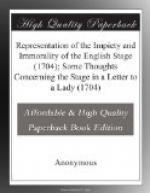The pamphlet must have been completed late in 1703 or very early in 1704. The references to the storm and the performances of ‘Macbeth’ and ‘The Tempest’ would place its final composition after late November, 1703, and it was in print in time to be distributed at the churches on January 19 and also to be advertised in the ‘Daily Courant’ for January 20 under the heading “This present day is publish’d.” The fact that it quickly attained three editions during 1704 may be partially accounted for by its being given to churchgoers, for it seems unlikely that the pamphlet would have a tremendous sale, even if one allows for the strong opposition to the stage which persisted in the minds of many people at the turn of the century. The author of the tract is unknown, although Sister Rose Anthony in ‘The Jeremy Collier Stage Controversy, 1698-1726’ (Milwaukee, 1937), pages 194-209, ascribed it to Jeremy Collier, an attribution which E. N. Hooker, in a review of the book in ’Modern Language Notes’, LIV (1939), 388, and also in ’The Critical Works of John Dennis’, I, 501, has deemed unlikely.
Advertised also in the ‘Daily Courant’ for January 20, 1704, under the heading “This present day is publish’d” and in the same paragraph with the advertisement of ‘A Representation’, was another short pamphlet, ‘Some Thoughts Concerning the Stage in a Letter to a Lady’. (Immediately below this notice of publication was a re-advertisement of Jeremy Collier’s ‘Dissuasive from the Play-House’, with the result that, on the day following the Fast Day, three of the pamphlets attacking the stage and referring to the performances of plays representing tempests soon after the destructive storm of November 26-27, 1703, were brought simultaneously to the attention of the public.)
It seems clear that the publication and distribution of these books was a feature in the activities of the Societies for Reformation of Manners. The anonymous ‘Account of the Progress of the Reformation of Manners’ (13th ed., 1705) boasted that the Societies had enlarged their design by causing books to be written which aimed at “laying open to the World the outragious Disorders and execrable Impieties of our most Scandalous Play-Houses, with the fatal Effects of them to the Nation in general, and the manifest Sin and Danger of particular Persons frequenting of them” (p. 2). Defoe’s ‘Review’ (III, no. 93, for August 3, 1706) pointed out that thousands of Collier’s books had been distributed at the church doors by the Societies for Reformation of Manners and the founders of the Charity Schools. Obviously the Societies did not restrict themselves to the works of Collier. Incidentally, the habit of Collier and his followers of giving excerpts to illustrate the profaneness and immorality of the stage produced an unexpected effect in at least one quarter. The same issue of the ‘Review’ tells us that the Rev. Dr. William Lancaster, archdeacon of Middlesex, objected strongly to the dispersal of anti-stage tracts at the door of his church, on the grounds that they tended “to teach the ignorant People to swear and curse.”




